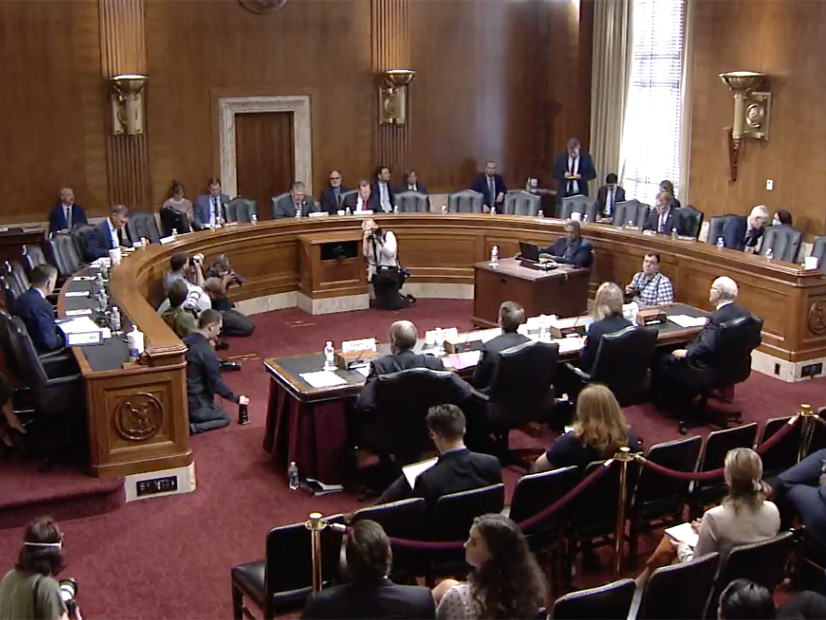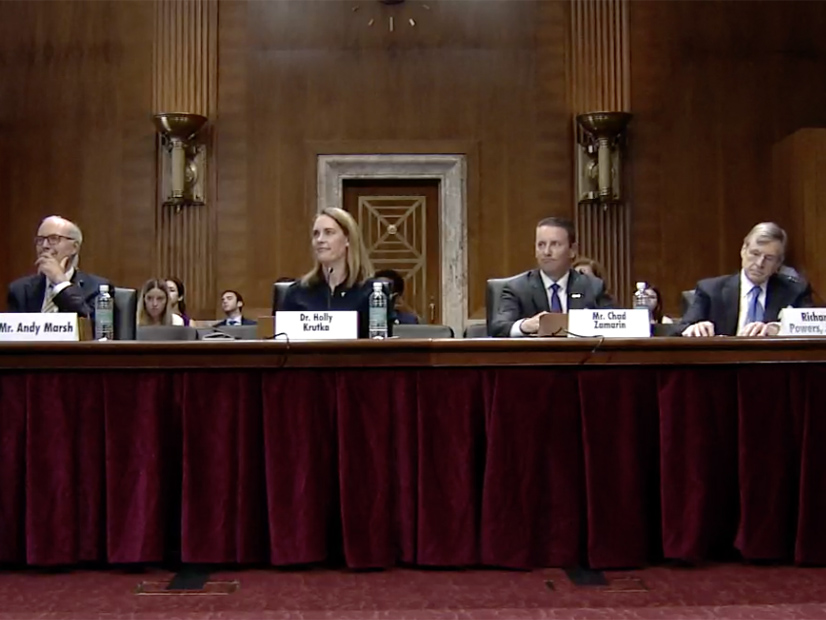
Fears that FERC’s regulations — and those who use them to challenge gas pipelines — will stymie the development of a national hydrogen pipeline system pervaded a Senate Energy and Natural Resources Committee hearing Tuesday.
Chairman Joe Manchin, (D-W.Va.) set the tone in his opening remarks, saying the nation’s energy infrastructure is facing a “crisis.”
“We face huge challenges getting the energy infrastructure we absolutely need sited, permitted and built — challenges that weaken our energy security and jeopardize our ability to meet our climate goals,” he said. “We can’t be short-sighted here. We need to look to the future and play the long game. We must get the right regulatory structure in place now, at the ground floor, that will help us accelerate hydrogen to scale in this country.”
Noting that the nation now has only 1,600 miles of hydrogen pipeline, Manchin predicted new pipelines would have to be built, even if existing gas lines are used to move a blend of natural gas and hydrogen. And those pipeline expansions would likely come under the purview of FERC, he added.
“Clarity is important for hydrogen pipeline developers, producers, consumers and communities potentially affected by this development. It appears there’s uncertainty today around which federal laws to apply to interstate hydrogen infrastructure, and also about which federal agencies could or should be involved in siting, permitting and setting rates for using this infrastructure. If that is the case, our committee should take steps to ensure predictable and effective regulatory framework because regulatory uncertainty benefits no one. There’s a compelling argument for FERC to play a role for interstate hydrogen infrastructure similar to the responsibilities it has for natural gas and petroleum pipelines today for natural gas.”
Sen. John Barrasso, (R-Wyo.), the committee’s ranking Republican, said existing natural gas pipelines “are equipped to ship methane blends, which can include up to 20% hydrogen.” He said he does not believe there is a “regulatory gap that Congress needs to fill.”
He argued that environmentalists are working to make sure hydrogen pipelines are never built and that gas pipelines are not permitted to expand.
“Our country’s natural gas pipelines are under unprecedented attack. Well-funded environmental extremist activist groups are throwing the kitchen sink at every new project,” he said.
“The current majority of the FERC wants to make it impossible to upgrade pipelines or build new ones. …
“I’m concerned that some of the commission may seek to make the ability to ship higher blends of hydrogen a reason to impose new conditions on newer upgraded natural gas pipelines,” Barrasso said. “If that happens it’d be a disaster. Let’s not give these activists or the commission another weapon to use against natural gas pipelines.”
Witnesses
The committee listened to the comments of four expert witnesses who are involved in the production or distribution of natural gas or hydrogen, and knowledgeable about the current state of regulation.
Andy Marsh, president and CEO of Plug Power (NASDAQ:PLUG) and a hydrogen industry expert, said pipelines will be crucial.
“I think probably the most important items are the rights of ways. … To be able to use natural gas pipeline rights of way will help avoid unnecessary roadblocks,” he said. “I would suggest that the committee encourage FERC to lean on the industry experts,” he said.

Holly Krutka, executive director of the School of Energy Resources at the University of Wyoming, said she and others at the school see hydrogen as “an important component of the energy future.” But she warned that new regulations on hydrogen could impinge on the state and region’s robust natural gas industry
“It’s critical that hydrogen regulations do not negatively impact natural gas production, transportation and consumption. When it comes to standing up a hydrogen industry, Wyoming is standing on a strong foundation,” Krutka said.
“In addition to being a leading energy producer, the state hosts a robust and expansive rail system, and that rail system could be used to transport clean ammonia,” she said in a reference to converting hydrogen to ammonia, a liquid that is more easily transported.
“We also have an extensive natural gas pipeline network, and that offers the opportunity to transport clean hydrogen and blends of hydrogen and methane, which is probably the most likely opportunity in the near future,” she said.
But she added that the industry fears that federal mandates aimed at reducing methane leakage could upend hydrogen as well as natural gas development.
“If, for example, new natural gas infrastructure would also have to comply with new FERC-imposed mandates related to transporting blends of natural gas and hydrogen, I would worry that the infrastructure would never get built. Therefore, I and others in Wyoming are concerned about the imposition of new federal standards that could have unintended consequences on natural gas production and transportation.”
Chad Zamarin, senior vice president for Williams Co. (NYSE:WMB), said the only way to scale up hydrogen production and use is to “leverage” gas pipelines.
“FERC is, as has been mentioned, our primary regulator for interstate natural gas pipelines. And it does seem like that’s a likely venue for us to approach with respect to hydrogen. That said, we are concerned that we don’t want to create a traffic jam before the car even gets out of the garage,” he said. “The current FERC process has become an incredibly difficult process to facilitate the building of energy infrastructure. …
“We’ve proposed in our written testimony some very simple changes that if the Congress were to act, we think could streamline the FERC permitting process and ensure that we can bring the infrastructure needed to not only continue delivering the critical natural gas here and around the world, but the hydrogen that we believe we can bring to market through our infrastructure. These changes are relatively simple, and Congress has the power to implement them,” Zamarin said.
Richard Powers, partner and head of the energy practice group at the law firm Venable, said it is clear that FERC is the agency that has the authority to regulate hydrogen pipelines.


